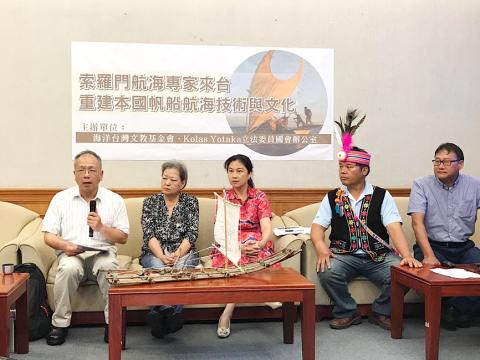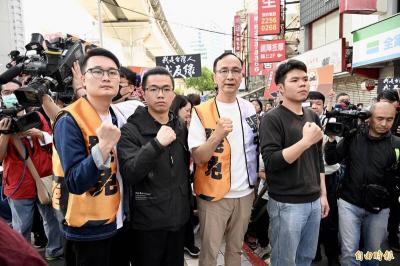Aborigines should revive the art of making sailboats to recover their connection with Austronesian people worldwide, Democratic Progressive Party Legislator Kolas Yotaka and Aboriginal culture advocates said yesterday.
At a news conference at the Legislative Yuan in Taipei, Kolas said when she visited Maori in New Zealand and told them she came from Taiwan, they often responded: “That is where our ancestors came from.”
“In our school textbooks we were always told to look to China, but we have never looked to the east and the Pacific Ocean,” she said.

Photo: Peng Wan-hsin, Taipei Times
Council For Farangaw Autonomy chairman Raranges Hoki Na Tungaw (羅福慶) said his organization has been trying to revive the Aboriginal art of making sailboats, what the Amis call fayan.
A fayan is a boat made of bamboo poles and a triangular or rectangular sail, he said.
His elders used to cross the “black tides” between Taiwan and Green Island (綠島) on this type of boat, he said.
Raranges said the council successfully reproduced a traditional sailboat in 2014 for the first time since the tradition died out and it now hopes the art can be handed down to the younger generation.
“Our culture has been withering, which makes us feel very insecure and anxious,” he said, adding that reproducing the sailboat would be one way to revive Aborigines’ adventurous spirit that connects them to the ocean.
Foundation of Ocean Taiwan chief executive officer Liu Chiung-hsi (劉炯錫) said his organization plans to visit Aboriginal elders in the east to collect more knowledge and stories about making boats.
The foundation would invite elders of the Taumako on the Solomon Islands to exchange their sailing knowledge with Taiwanese Aborigines next month or in September, he said, adding that the foundation also plans to sail its boats to Okinawa, Japan, next year.
“Sailing is the instinct of Austronesian Aborigines,” National Cheng Kung University Institute of Archeology director Liu Yi-chang (劉益昌) said.
“The ocean is not a barrier, but a pathway,” Liu said.

The Ministry of Economic Affairs has fined Taobao NT$1.2 million (US$36,900) for advertisements that exceeded its approved business scope and ordered the Chinese e-commerce platform to make corrections in the first half of this year or its license would be revoked. Lawmakers have called for stricter supervision of Chinese e-commerce platforms and more stringent measures to prevent China from laundering its goods through Taiwan as US President Donald Trump’s administration cracks down on origin laundering. The legislature’s Finance Committee yesterday met to discuss policies to prevent China from dumping goods in Taiwan, inviting government agencies to report on the matter. Democratic Progressive Party

Taiwan and its Pacific ally Tuvalu on Tuesday signed two accords aimed at facilitating bilateral cooperation on labor affairs, according to Taiwan’s Ministry of Foreign Affairs (MOFA). The governments inked two agreements in Taipei, witnessed by Foreign Minister Lin Chia-lung (林佳龍) and visiting Deputy Tuvaluan Prime Minister Panapasi Nelesone, MOFA said in a news release. According to MOFA, the agreements will facilitate cooperation on labor issues and allow the two sides to mutually recognize seafarers’ certificates and related training. Taiwan would also continue to collaborate with Tuvalu across various fields to promote economic prosperity as well as the well-being of their

Taiwan would welcome the return of Honduras as a diplomatic ally if its next president decides to make such a move, Minister of Foreign Affairs Lin Chia-lung (林佳龍) said yesterday. “Of course, we would welcome Honduras if they want to restore diplomatic ties with Taiwan after their elections,” Lin said at a meeting of the legislature’s Foreign Affairs and National Defense Committee, when asked to comment on statements made by two of the three Honduran presidential candidates during the presidential campaign in the Central American country. Taiwan is paying close attention to the region as a whole in the wake of a

The Taipei District Prosecutors’ Office has continued its investigation into allegations of forged signatures in recall efforts today by searching the Chinese Nationalist Party’s (KMT) city chapter and questioning several personnel including the chapter director, according to media reports. Among those questioned and detained were KMT Taipei chapter director Huang Lu Chin-ju (黃呂錦茹), chapter secretary-general Chu Wen-ching (初文卿), chapter secretary Yao Fu-wen (姚富文) and first district committee executive director Tseng Fan-chuan (曾繁川). Prosecutors said they would not confirm reports about who had been summoned. The investigation centers on allegations that the ongoing recall campaigns targeting Democratic Progressive Party legislators Rosalia Wu (吳思瑤)